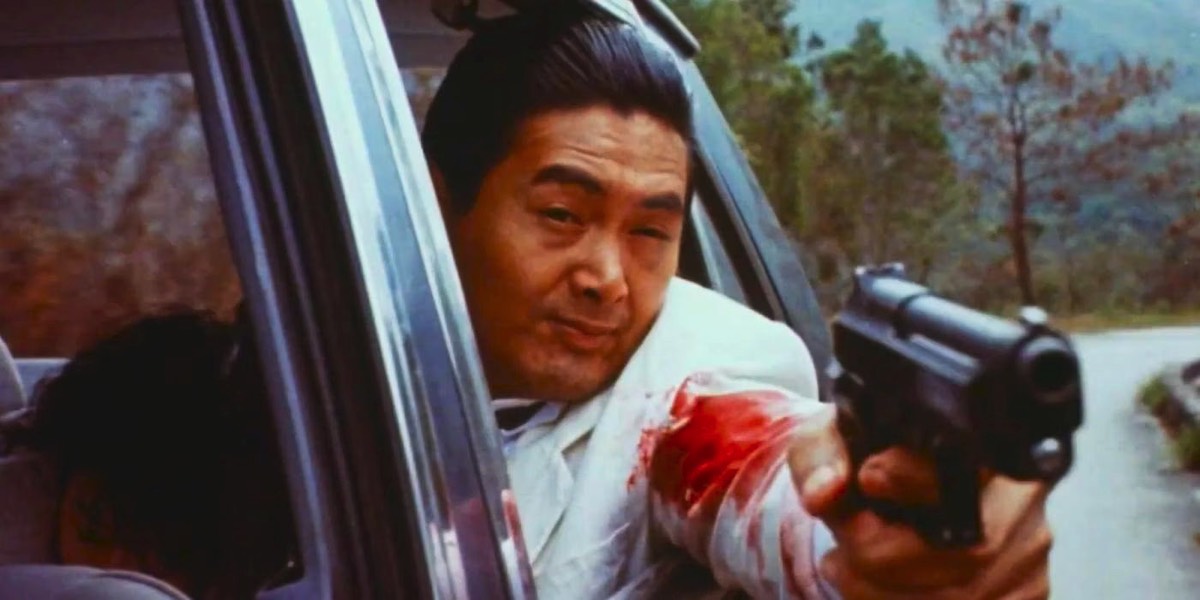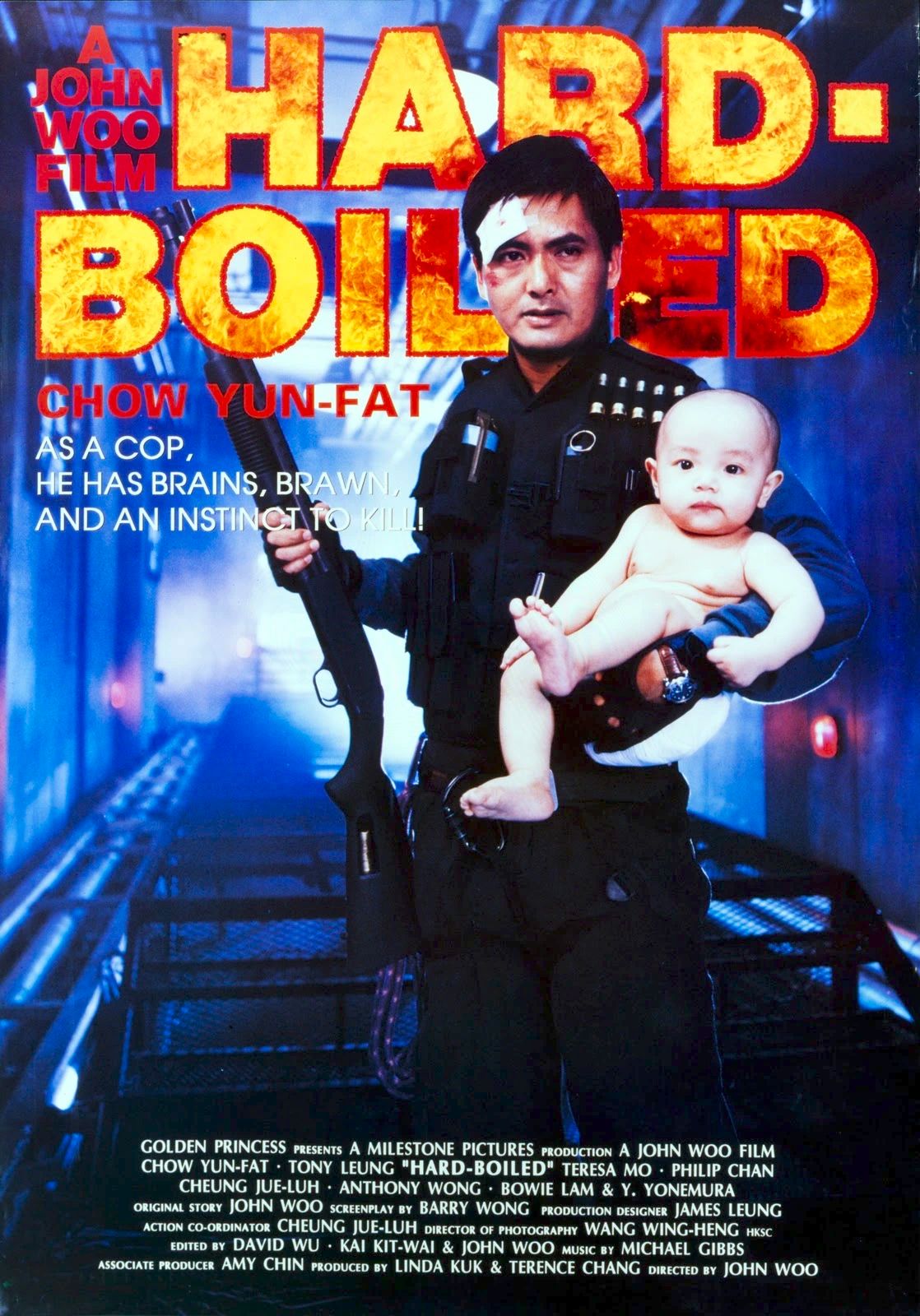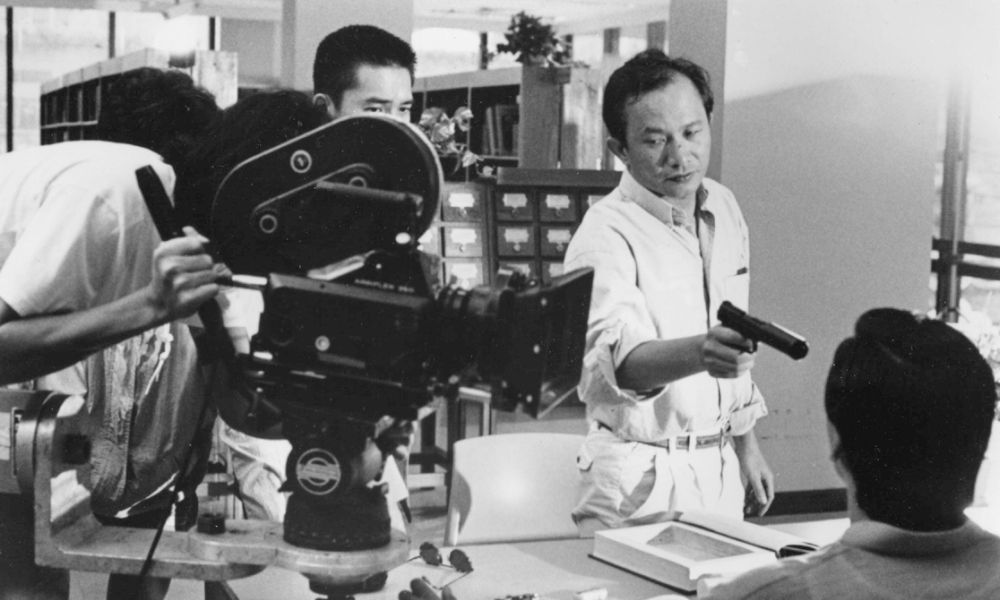"Woo’s Hollywood-gangster-film-inspired plots are a mixture of ripe sentimentality and macho romance with a moral grounding in such virtues as friendship, loyalty, and duty to God and country. Like the Italian action specialist Sergio Leone, dean of the ‘‘spaghetti Western,’’ Woo treats the clichés of the genre as grand myths." - John McCarty (International Dictionary of Films and Filmmakers, 2000)
John Woo
Director / Screenwriter / Producer / Editor
(1946- ) Born September 23, Guangzhou, China
(1946- ) Born September 23, Guangzhou, China
Key Production Countries: Hong Kong, USA, China
Key Genres: Action, Action Thriller, Gangster Film, Crime, Chase Movie, Buddy Film, Spy Film, Martial Arts
Key Collaborators: Terence Chang (Producer), Wong Wing-hang (Cinematographer), Chow Yun-Fat (Leading Actor), David Wu (Editor), Tony Leung (Leading Actor), Tsui Hark (Producer), Steven Kemper (Editor), Kenneth Tsang (Leading Character Actor), John Travolta (Leading Actor), Nicolas Cage (Leading Actor), Leslie Cheung (Leading Actor), Ti Lung (Leading Actor)
Key Genres: Action, Action Thriller, Gangster Film, Crime, Chase Movie, Buddy Film, Spy Film, Martial Arts
Key Collaborators: Terence Chang (Producer), Wong Wing-hang (Cinematographer), Chow Yun-Fat (Leading Actor), David Wu (Editor), Tony Leung (Leading Actor), Tsui Hark (Producer), Steven Kemper (Editor), Kenneth Tsang (Leading Character Actor), John Travolta (Leading Actor), Nicolas Cage (Leading Actor), Leslie Cheung (Leading Actor), Ti Lung (Leading Actor)
"Even before John Woo came to Hollywood, there were connoisseurs of his Hong Kong work who would seek out his action films at video stores. Equally, there are those who claim to find a kind of streamlined poetry in his American pictures—as opposed to the evidence of how a culture like that of Hong Kong had become degraded, long ago, by the attempt to live up to American models... He was a film fan as a kid and he entered Cathay Film in 1969 and worked his way up from script boy, studying with Chang Sen and Chang Cheh. Though enthusiastic about martial arts pictures, his Hong Kong work is actually quite varied—and much of it was very successful." - David Thomson (The New Biographical Dictionary of Film, 2010)
"Chinese-born director who made his name with Hong Kong-made films specialising in balletic, almost cartoon-like action bloodbaths. Although not as effective with actors, Woo had little difficulty establishing himself in the Hollywood mainstream after moving to America in 1992." - David Quinlan (Quinlan's Illustrated Guide to Film Directors, 1999)

The Killer (1989)
"A virtuoso of the modern action film, Woo is not only notable for hyperbolic set-pieces involving massive explosions, implausible body-counts and seemingly inexhaustible arsenals of firepower; he is also fascinated by male bonding, loyalty and treachery, and a relativist view of crime and punishment. His baroque, technically adept direction can seem excessive and hysterical: his films alternate between brief soul-searching scenes of almost cloying sentimentality (often verging on the homoerotic) and lengthy sequences in which the antagonists' dynamically violent antics are staged with lurid colours, super-loud sound effects, and an array of editing devices such as slow-motion, dissolves and freeze-frame." - Geoff Andrew (The Director's Vision, 1999)
"In Hong Kong’s booming pre-handover industry, Woo spent the 80s and early 90s cranking out works of operatic, hyperkinetic intensity termed “gun fu” for their ballistic fusion of martial arts with the gangster picture. Admirers also described the movement he spearheaded as a cinema of “heroic bloodshed”, its wanton violence paired with a classical notion of honor and villainy not so far from melodrama. Blazing a path to Hollywood, where his critical regard and box-office grosses slipped after a few early successes, he remained staunchly committed to maximalism in mood and content. Even as budgets shrank and expanded, everything had to be larger than life – the emotions and the explosions." - Charles Bramesco (The Guardian, 2023)
"The director wears his influences on his sleeve: he fuses the stoic gangsters of Jean-Pierre Melville with the cathartic carnage of Sam Peckinpah and the flamboyant choreography in the films of Vincente Minnelli... Is there more to John Woo than florid shoot-outs and corny sentiments? Some critics have suggested he's essentially a trumped-up second unit director. It took him a long time (nearly twenty years) to define himself in the Hong Kong industry, where he initially toiled on formulaic martial arts quickies and lowbrow comedies. However, a protégé of martial arts specialist Chang Cheh, he learned to choreograph action at the master's feet." - Tom Charity (The Rough Guide to Film, 2007)
"While he worked consistently through the 70s making action films and comedies, he made his mark with the elemental gangster film A Better Tomorrow (1986). This film provided the model for his subsequent features: anguished and sometimes brutal central characters (often portrayed by actor Chow Yun-Fat); a serious-minded story about loyalty and betrayal; and graphic, cathartic violence. His films gathered an American cult of critics and fans, who (often condescendingly) viewed the films as camp." - The Film Encyclopedia, 2012
"Hong Kong director John Woo moved to Hollywood in the early 1990s before the handover of the territory's British sovereignty to the Chinese. By that time he had reached the height of his creative powers... His flamboyant cinematic style comprising swooping crane shots, multi-angel coverage, and slow-motion replays - along with his trademark two-gun shoot-outs - was much copied in the 1990s." - Ronald Bergan (Film - Eyewitness Companions, 2006)
"Typically, my violence has a good thought behind it, like helping others or serving justice. Sometimes the more extreme violence in my movies is a response to evil. There are two qualities in my movies that reflect man’s true character: honesty and loyalty. And a love for other people." - John Woo (The New Yorker, 2023)
Selected Filmography
{{row.titlelong}}
John Woo / Favourite Films
The 400 Blows (1959) François Truffaut, The Exorcist (1973) William Friedkin, The Godfather (1972) Francis Ford Coppola, Lawrence of Arabia (1962) David Lean, Mean Streets (1973) Martin Scorsese, Psycho (1960) Alfred Hitchcock, Le Samouraï (1967) Jean-Pierre Melville, Seven Samurai (1954) Akira Kurosawa, The Umbrellas of Cherbourg (1964) Jacques Demy, West Side Story (1961) Robert Wise & Jerome Robbins, The Wild Bunch (1969) Sam Peckinpah.
Source: Brutus Cinema (1998)
See more of John Woo's favourite films at LaCinetek (2018).
The 400 Blows (1959) François Truffaut, The Exorcist (1973) William Friedkin, The Godfather (1972) Francis Ford Coppola, Lawrence of Arabia (1962) David Lean, Mean Streets (1973) Martin Scorsese, Psycho (1960) Alfred Hitchcock, Le Samouraï (1967) Jean-Pierre Melville, Seven Samurai (1954) Akira Kurosawa, The Umbrellas of Cherbourg (1964) Jacques Demy, West Side Story (1961) Robert Wise & Jerome Robbins, The Wild Bunch (1969) Sam Peckinpah.
Source: Brutus Cinema (1998)
See more of John Woo's favourite films at LaCinetek (2018).
John Woo / Fan Club
Filipe Furtado, Sean Gilman, Jeffrey M. Anderson, Fung Ka Ming, Anjelika Artyukh, Will Sloan, Li Cheuk-to, Tara Brady, Anupama Chopra, Stephanie Zacharek, Edgar Wright, David Bordwell.
Filipe Furtado, Sean Gilman, Jeffrey M. Anderson, Fung Ka Ming, Anjelika Artyukh, Will Sloan, Li Cheuk-to, Tara Brady, Anupama Chopra, Stephanie Zacharek, Edgar Wright, David Bordwell.
"Fan Club"
These film critics/filmmakers have, on multiple occasions, selected this director’s work within film ballots/lists that they have submitted.
These film critics/filmmakers have, on multiple occasions, selected this director’s work within film ballots/lists that they have submitted.


